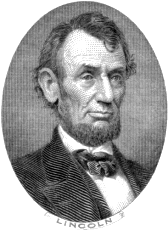Newcomb: A look back at Lincoln
In “The Red Man in the New World Drama” (Vine Deloria Jr.’s edition, 1971), Jennings C. Wise pointed out that Lincoln’s economic policies resulted in tremendous areas of land being opened to colonization. As Wise noted, various states were granted 71 million acres of “public domain” lands (Indian lands) before 1873. Another 85 million acres were pre-empted (claimed) by homesteaders under the 1862 Homestead Act. And another 155 million acres of Indian lands, including “rights of way and alternate sections of non-mineral bearing lands,” were “granted outright” to “corporate interests which undertook to finance the construction of the transcontinental railroad.”
This, along with the destruction of the Indian food supply, was part of the U.S.’s “final solution” to “the Indian problem.” It was part of an array of policies designed to break Indian resistance to the extinguishing of their traditional, free way of life in order to make way for the railroads and the continued expansion of what George Washington termed “a rising empire.” Lincoln’s economic policies were key to the efforts of those who “settled the West,” to use a phrase from President Obama’s inaugural address.


2 comments:
Thank you, Rob, for being willing to give some critical attention to Obama's inauguration speech, unlike many other media outlets. Lincoln was not a friend to Indians. Nor was George Washington or Andrew Jackson or pretty much any other president I can think of. There is a reason the Mohawk call the presidents "Rahnatakias" = town destroyer. I also think it is important to listen to judge someone by their own actions, no matter how likely you may think they are to disappoint. Undoubtedly, in this (so far) Obama-supporting NDN's opinion, the inauguration speech was poorly worded, and a let down to me as an NDN. However, I have also heard and seen many things thus far that I like from Obama, and as skeptical as I am, he appears to be of good character, particularly for a politician. So I am willing to give him a chance, and even to be optimistic about his administration. Before we jump the gun and put Obama in the same rank as Lincoln and other famous Indian haters, let us wait to have real reason to judge him on his own actions. You may be interested to check out Obama's policy/priority outline for Native issues: http://my.barackobama.com/page/content/firstamissues
You can also find similar outlines there for civil rights, healthcare, poverty/economy, education, and other areas that also affect our communities as Natives and U.S. citizens.
And you can't forget the Sioux Uprising of 1862 which occured on Lincoln's watch because the government was not keeping its end of land-deal bargain with the Dakota.
Post a Comment